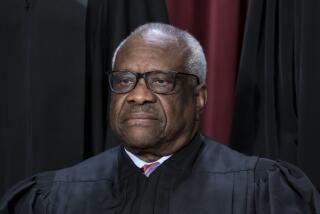Senator Seeks Bigger Tax Bite on Use of Corporate Jets
- Share via
When executives use a corporate jet on vacation, taxpayers often help pay for the ride. But that would change under a proposal now before Congress.
Personal use of a corporate jet is considered income by the Internal Revenue Service, and the lucky passengers are obliged to pay taxes on it. But the U.S. Tax Code allows most executives and other employees to value a flight aboard a Gulfstream V as if they were squeezed into the middle seat on a cramped commercial airliner.
To Sen. Mark Dayton (D-Minn.), tax law shouldn’t reward use of corporate jets for golfing jaunts in the Bahamas.
“If the directors and shareholders of a company want to provide a luxury perk to an executive who probably already makes $10 million a year, that’s their business,” Dayton said. “But these executives should pay taxes on what they’re getting -- and they should pay tax on the actual value, not some artificially low cost.”
Dayton wants to tax personal flights at whichever is higher: the fair market value of the trip, or a pro-rated share of what the company deducted for the flight on its taxes. The latter is based on all of the costs associated with the aircraft, including ownership, crew salaries, hangar space and landing fees.
The National Business Aviation Assn., which represents operators and manufacturers of corporate aircraft, is opposing the bill, saying it is concerned that the tax consequences could lead companies to fly commercial instead.
“Why this is a concern to us is jobs,” said Dan Hubbard, vice president of the organization. “Companies that are looking to replace their corporate jets may decide not to because of this legislation.”
Executives aren’t the only ones who benefit from corporate jets, Hubbard said, noting that rank-and-file workers occasionally hitch rides on them as well.
Lawmakers, however, believe the problem lies with executives. In 2004, Congress demanded that the chief executives and other high-level managers and directors at both public and private companies pay tax on the fair market value of their personal flights.
The action came after disclosure of the millions of dollars in perks paid to retired General Electric Co. Chief Executive Jack Welch, including unlimited use of GE’s Boeing 737 at a reported cost of $291,869 per month.
Dayton’s proposal would, in essence, extend this policy to any corporate employee who gets a joy ride on the company jet, generating an estimated $36 million in taxes over five years, according to the House-Senate Joint Committee on Taxation.
The committee based that estimate on the difference between what companies reported as personal use of corporate aircraft and the amount that corporate employees reported as taxable income on their returns.
In terms of revenue, Dayton’s is only a minor element in the $70-billion Tax Relief Extension Reconciliation Bill of 2005. Most of that legislation focuses on continuing popular tax breaks, such as those allowing parents to deduct a portion of college tuition costs for their children.
The bill is now in a House-Senate conference committee. Dayton’s amendment, among others, has emerged as a sticking point among House Republicans, who say they don’t want anything in the bill that can be construed as a tax increase.
Senate Majority Leader Bill Frist (R-Tenn.) has urged the conference committee to come to an agreement before Congress begins its spring recess this weekend.
If the amendment passes, companies could agree to pick up the additional income tax costs for their employees -- as they do for some CEOs now.
Gap CEO Paul Pressler, for example, had personal travel on corporate aircraft valued at $148,481 last year, according to the company’s proxy statement. Gap paid Pressler $70,861 to cover the income tax he owed for these personal flights.
Amid increased scrutiny of executive pay, however, most companies are unlikely to extend such tax benefits to other executives and employees, said Paul Hodgson, senior research associate with Corporate Library, a shareholder advocacy group.
“Tax reimbursement is one of the largest red flags that a board can waive about its poor decision-making,” he said.
In addition, companies generally do not give the same perks they lavish on chief executives to those lower in the chain of command, Hodgson said.
Dayton acknowledged that the amount of tax revenue that would be generated by his amendment would be relatively modest. But he said it was an important measure in upholding the integrity of the Tax Code.
“The fundamental principle of taxation in this country used to be that if you earned more money, you paid more taxes,” he said. “When you give special favors, especially to the wealthiest people in the country, you have no credibility in the system. Working Americans have a right to believe that everyone is following the same rules.”
More to Read
Sign up for Essential California
The most important California stories and recommendations in your inbox every morning.
You may occasionally receive promotional content from the Los Angeles Times.













